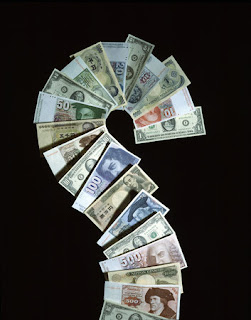
In 1999, the Euro currency started trading in world financial markets. The Euro coins & banknotes replaced German marks and fifteen other EU member states currencies on January 1, 2002. The euro zone includes almost 300 million people. Outside of the EU, 23 countries peg their currencies to the Euro (175 million people). The Euro currency's highest rate against the dollar was in 2008 at $1.599 and the lowest was in 2000 at $.8252.
In 2008, Germany, France & the UK accounted for almost 60% of the total GDP of the EU countries ( the UK is a member of the EU without adapting the euro currency). Germany's share of GDP of Euro currency countries is over 30%.
The German government has approved a EU Greek rescue package of 110 billion euros and a plan to be unveiled tomorrow that will help support the euro currency. It is clear that the citizens of Germany are wondering what happened to their strong currency, the D-Mark. The results from elections held in Germany today point to rejection of support for the Greek rescue. What will happen next?
Contagion erupted in American markets last week and will probably continue into this week. Gold is hitting all time highs as speculators are broadcasting doomsday forecasts. It is up to the German government to stop this speculation immediately.
German chancellor Angela Merkel must take the leadership role in the EU or face the end of the Euro currency. Time is running out for Europe and it will spread to the rest of the world within hours.
Random thoughts....Obama, Bernanke and Geitner realize that the problem is the EU and not Goldman Sachs....it is time to focus on the global sovereign debt problem...Spain could be next and that will not be pretty....









